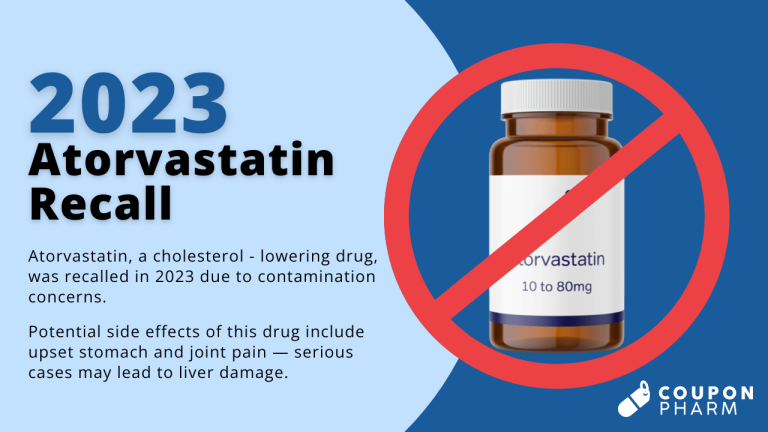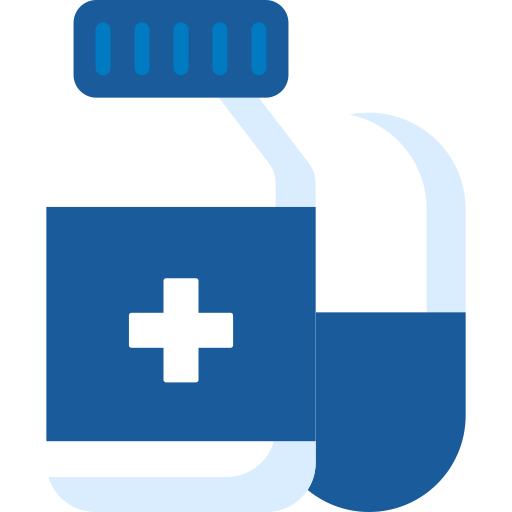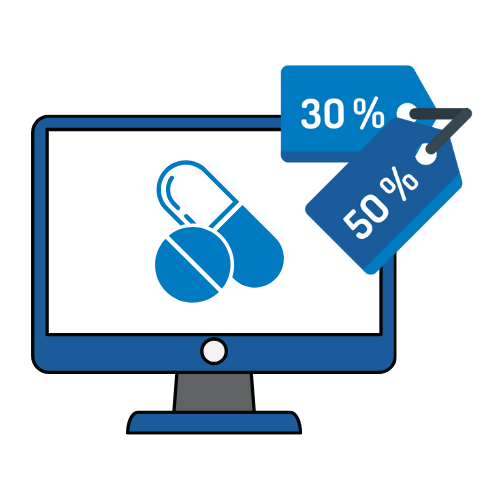Atorvastatin Recall 2023
- Last Updated: January 4th, 2024
Key takeaways:
Atorvastatin, a cholesterol - lowering drug, was recalled in 2023 due to contamination concerns.
Potential side effects of this drug include upset stomach and joint pain — serious cases may lead to liver damage.
Consumers can turn to alternative medications such as Simvastatin, Pravastatin or calcium supplements if needed.
Check your medication bottle for company names like RemedyRepack or batch recall dates mentioned on the FDA website. This will help you identify if your medicine is affected by the recall.
Atorvastatin Recall 2023: Introduction
On this page, we’ll discuss the Atorvastatin Recall 2023 experienced, why Atorvastatin was recalled in 2023, analyze the impact of the Atorvastatin recall, and much more.

Overview of the Atorvastatin Recall of 2023
Are you concerned about the recent Atorvastatin recall of 2023?
This widely-used cholesterol-lowering drug is now being subjected to a widespread recall due to potential contamination.
Our comprehensive article will walk you through all the essential details surrounding this critical issue, such as the reason for the recall, its impact on consumers like you and alternative solutions available.
Stay alert for vital updates – keep reading!
Table of Contents
What is Atorvastatin and Why is it Being Recalled?
Atorvastatin is a medication used to control high cholesterol levels, however, its 2023 recall was triggered by concerns of possible contamination with small glass particles in the calcium tablets.
Definition of Atorvastatin
Atorvastatin serves as a powerful medication, falling under the category of statins.
Its primary function is to lower high cholesterol levels and fend off potential risks associated with heart disease and stroke.
Offered on the market by the brand name Lipitor, it comes in varied strengths, catering to specific patient needs:
- 10 mg tablets
- 20 mg tablets
- 40 mg tablets
This drug’s effectiveness has been marred by instances of recalls due to possible contamination with minuscule glass particles leading to consumer safety concerns.
Hence pharmaceutical companies initiated these recalls proactively as an important step towards strengthening medical safety norms.
Details of the recall
The Atorvastatin calcium tablets recall began on November 9, 2012 when Ranbaxy Inc. flagged the potential contamination of 41 lots of their Atorvastatin Calcium Tablets.
Notably, these included doses of 10 mg, 20 mg and 40 mg tablets that were feared to contain tiny glass particles.
The company initiated a voluntary action which was later categorized as a Class II recall by the US Food and Drug Administration (FDA).
A similar recall took place in March of 2023 for RemedyRepack’s Atorvastatin calcium tablets in its distinctively packed bottles with a count of thirty tablets each at a dosage level of 20-mg per tablet.
There was more than one issue leading to this major drug recall event.
For instance, N-nitrosodiethylamine (NDEA), an impurity that naturally occurs during manufacturing processes, contributed significantly towards the risk associated with consumption of these specific lots.
Another incident saw Jamp-Atorvastatin recalling its calcium medication due to incorrect labeling where some bottles labeled as containing only ten milligrams actually held forty milligram tablets instead.
This series recalls heightened safety concerns among consumers relying on drugs like Atorvastatin calcium tablets for maintaining their health status.
Other drug manufacturers including Accord and CVS also faced related recalls around this time frame which further stirred up issues pertaining to trust and quality assurance in pharmaceutical industries.
Impact of Atorvastatin Recall on Consumers
The Atorvastatin calcium tablets recall has left consumers concerned about potential side effects and seeking alternative medications that are just as effective and affordable.
Potential side effects
Taking Atorvastatin calcium tablets has certain potential side effects that you should be aware of.
Common occurrences may include diarrhea, upset stomach, and joint or muscle pain.
Changes in specific blood tests may also surface as part of the body’s response to this drug.
More severe cases can lead to liver damage due to an increase in liver enzymes brought on by the medication itself.
It is crucial for users to take note of these possible outcomes for better health management while undergoing treatment with Atorvastatin.
Availability of alternative medications to Altorvastatin (such as Simvastatin tablets & Pravastatin Sodium Tablets)
The recall of Atorvastatin calcium tablets has affected many consumers, but there are several alternative medications available.
These options can help maintain your cholesterol levels and protect your heart health:
- Simvastatin tablets: These operate similarly to Atorvastatin calcium tablets, lowering bad cholesterol and raising good.
- Pravastatin sodium tablets: Pravastatin works by reducing the production of cholesterol in your body.
- Rosuvastatin tablets: Rosuvastatin is another statin option that can reduce the risk of heart disease and stroke.
- Calcium tablets: Some doctors may recommend calcium supplements, especially for those who cannot tolerate statins.
Timeline of the Atorvastatin Recall of 2023
This section will delve into the exact timeline of events surrounding the Atorvastatin recall in 2023, including when it was initiated and how it progressively expanded.
Date of initial recall
The Atorvastatin recall sprang into action on March 13, 2023. Direct Rx, a well-known pharmacy service provider initiated the recall and implemented corrective measures immediately.
This was a vital decision due to the gravity of potential health risks linked with the identified impurity in Atorvastatin.
Expanding recalls
Pfizer recently extended the scope of their Lipitor, or Atorvastatin, recall to a staggering 19,000 bottles of 40 milligram pills.
In response to this growing safety concern, RemedyRepack also took voluntary action by initiating recalls for their atorvastatin 20-mg tablets packaged in 30-count bottles.
Now more than ever, consumers should stay vigilant and keep themselves informed about the affected lots distributed in the market.
Each update from these pharmaceutical giants hints towards an expanding horizon of recalls with no end date currently ruled out.
It’s not only crucial but imperative for every consumer related to this drug to scrutinize the NDC and EXP details on their bottle while continuously keeping an eye out for new FDA announcements relating to Atorvastatin Calcium Tablets’ recall status.
Explanation from Pfizer
Pfizer, the manufacturer of Atorvastatin calcium tablets, has provided details on the cause of this recall.
The company is working diligently to address and correct the identified problem.
It remains committed to ensuring patient safety and delivering high-quality medications.
Reason for recall
Pfizer, the manufacturer of Atorvastatin, initiated a voluntary recall of the drug due to potential contamination.
The company discovered that very small glass particles may have possibly infiltrated select batches during production.
This significant safety concern forced Pfizer to take swift action and pull affected lots from the market.
Their primary goal was to protect consumers from harm or physical irritation that might occur from ingesting these microscopic intruders.
Clear proof of potential risk came in November when adverse experiences were reported by some users, making it immediately clear that prompt corrective measures needed to be taken for public safety.
Steps being taken to address the issue
Pfizer is taking multiple concrete measures to address the recall of Atorvastatin:
- The company first initiated a voluntary nationwide recall action on Accuretic tablets.
- Another active step Pfizer took involved RemedyRepack, as they jointly started recalls for Atorvastatin calcium tablets.
- They have been proactively working to control potential risks associated with the medications in the recall.
- In an aggressive move, Pfizer recalled blood pressure drugs that had a potentially cancer-causing impurity, putting public safety at paramount importance.
- The ongoing recalls are part of wider, systematic efforts by Pfizer to mitigate issues related to the drugs and maintain trust among consumers.
Customers Affected by the Recall of Atorvastatin in 2023
This section delves into the types of customers who regularly use Atorvastatin, providing detailed information on how they can determine whether their medication is part of the recall.
Types of customers using Atorvastatin Calcium Tablets
Atorvastatin attracts a wide range of users due to its effective control over high cholesterol levels.
These customers often have a history of heart disease or are at elevated risk for such conditions, including individuals with hypertension, diabetes, obesity or those who smoke.
A significant proportion hail from the aging population segment since cholesterol issues tend to increase with age.
People leading sedentary lifestyles may use Atorvastatin as part of their treatment plan too.
Lastly, consumers seeking preventive measures against cardiovascular disease also populate the user base for Atorvastatin.
How to check if your medication is affected
Ensuring the safety of your medication is a crucial step in maintaining health.
Here are some ways you can check if your Atorvastatin medication is affected by the recall:
- Carefully analyze the label on your medication bottle. Look for RemedyRepack, the company responsible for the atorvastatin 20-mg tablets recall in March 2023.
- Verify if your medication matches to the 30 – count bottles, which were primarily included in this recall.
- Check for any unusual symptoms after taking the drug. Seek immediate medical attention if there’s an issue.
- Visit FDA’s website and search for Atorvastatin Calcium Tablets recall notices — cross verify with your medicine batch number.
- Note down the date November 9, 2012: Ranbaxy Inc.’s initiated a voluntary recall on this day — ensure that your batch doesn’t belong to this period.
- Stay familiar with patient – level recalls and immediate actions required by keeping yourself updated through FDA alerts and notifications.
Recall Classification and Its Implications
This section will elaborate on the classification of this recall as a Class II and what that means for consumers.
We’ll discuss the importance of such classifications, shedding light on its implications for both safety measures and legal procedures surrounding drug recalls.
The potential harm posed by Atorvastatin will be explained, providing insights into why such classifications are crucial in prioritizing health crises.
Class II recall
The Food and Drug Administration (FDA) classifies a Class II recall as one where the use of or exposure to the recalled product could result in temporary or medically reversible health issues.
It is considered less severe than a Class I recall, which involves products that can cause serious harm or death.
The most common type of drug recall falls under this category, indicating that any potential harm from these drugs is usually not permanent.
For instance, Atorvastatin Calcium Tablets were part of such a Class II recall by Ranbaxy Inc., back in 2012.
In such cases, FDA’s role is to supervise how companies go about their recalls and evaluates if their actions are sufficient for protecting public health.
This kind of scenario shows us how important it is for manufacturers to carefully monitor post market modifications to high-risk medical devices because it might increase their risk profile leading up to an escalated recall classification.
Importance of classification
The classification of a recall is crucial as it signifies the potential level of harm to consumers.
In the context of drug recalls, such as Atorvastatin, a Class II classification indicates a risk that might cause temporary or medically reversible health problems.
This is not as severe as a Class I recall which suggests serious adverse health consequences or death but still holds validity in terms of its implications on the users’ health.
The Food and Drug Administration (FDA) takes responsibility for overseeing an organization’s recall strategy and classifying it based on these standards.
A clear understanding of this can help you judge the severity and urgency related to any recalled product announcement.
It also provides insight into what steps need to be taken by both – companies to address safety concerns, and consumers to protect their well-being in response to a recall alert.
Differences among classifications are thus important for effective communication about recalls between manufacturers, healthcare professionals, patients, and regulatory bodies like FDA.
Tips for Consumers Affected by the Atorvastatin Recall
This section will provide useful tips for consumers affected by the recall, covering essential steps to take if your medication is part of the recall, and offering resources on how to obtain affordable alternatives safely.
What to do if your medication is recalled
Managing a medication recall may seem daunting, but you can navigate this situation effectively with the right steps:
- Stay calm and avoid panicking.
- Check the FDA website for updates regarding the recall.
- Confirm whether your specific medication or lot number is part of the recall.
- Continue taking your medication as prescribed until you have spoken to a healthcare professional.
- Consult your healthcare provider or pharmacist about alternate medications available to you.
- Follow all instructions provided by the manufacturer and FDA concerning what to do with recalled medication.
- Report any adverse reactions or issues you’ve experienced with the recalled medication to the FDA.
- Keep an eye on updates from both the FDA and drug manufacturer for important information about when safe replacement medications become available.
Options for obtaining affordable medication
Navigating the landscape of obtaining affordable medication in light of the Atorvastatin recall can seem overwhelming — however, there are several avenues consumers can explore:
- Generics: Switch to generic versions of atorvastatin. It’s cost-effective and works similarly.
- Insurance Cover: Check your health insurance policy. It may cover alternatives to Atorvastatin.
- Drug Discounts: Look for pharmacists offering drug discount cards or coupons.
- Assistance Programs: Some pharmaceutical manufacturers offer patient assistance programs to those who cannot afford their medications.
- Bulk Buying: Consider purchasing a three-month supply instead of a one-month. This often reduces the total cost.
- Shop Around: Prices vary among pharmacies. Use online tools to compare prices before purchasing your medicine.
- Online Pharmacies: Legitimate online pharmacies often offer competitive pricing for prescription medications.
Other Recent Drug Recalls
An examination of recent drug recalls underlines the frequency of such incidents and their impact on public trust in pharmaceuticals.
Comparison to previous recalls
The Atorvastatin recall is not an isolated incident in the pharmaceutical industry.
Over the years, several drug recalls have occurred for various reasons, ranging from mislabeling to serious health risks.
Here are a few examples:
- Drug: Atorvastatin 20-mg tablets
- Manufacturer / Packager: RemedyRepack
- Reason for Recall: Not specified
- Date of Recall: March 20, 2023
- Drug: Blood Pressure Tablets
- Manufacturer / Packager: Aurobindo Pharma USA
- Reason for Recall: Potential cancer risk
- Date of Recall: October 2022
These recalls, including the latest involving Atorvastatin, highlight the need for rigorous testing and monitoring in drug manufacturing processes.
They also serve as reminders for consumers to stay informed and take necessary action when such occasions arise.
Impact on trust and safety in the pharmaceutical industry
Surges in drug recalls like the Atorvastatin recall of 2023 have raised concern among consumers and shaken trust in the pharmaceutical industry.
Individuals rely on these companies to maintain their health, making safety breaches significant.
The recent increase in recalls signals a possible lapse in quality control and regulatory oversight.
The possibility of adverse events related to recalled products further adds to anxiety levels.
For instance, as highlighted by the FDA, taking contaminated Atorvastatin could lead to unwanted health complications.
Such occurrences are damaging for both public confidence and industry reputation.
It becomes imperative that pharmaceutical firms prioritize stringent testing processes and robust quality assurance mechanisms.
Atorvastatin Recall 2023: Conclusion
The Atorvastatin recall of 2023 is undoubtedly an event with significant impact on all parties involved.
Consumers need to be extra cautious, ensure they have the most accurate information and explore alternative medications if necessary.
In these situations, open communication between pharmaceutical companies and consumers becomes increasingly important for maintaining trust and ensuring safety measures are in place.
The lessons learned from this situation will likely shape future procedures within the medical industry on how recalls are handled.
Frequently Asked Questions
-
The Atorvastatin recall in 2023 was issued by Accord Healthcare due to a probability of adverse experiences arising primarily from their manufactured products.
-
Adverse experiences, including injury, may be present in those who received the affected batch of Atorvastatin.
-
The recalled medications are usually specified by size and count – like a 90 count bottle — specific details would have been provided in an email sent by Accord Healthcare or available on their official website.
-
If you found out your medication has been recalled, it’s crucial to follow guidance issued by Accord Healthcare immediately for your safety.

Dr. Pharm
Pharmaceutical Drug Discount Expert


Determine your specific dosage and quantity needs to discover impressive savings opportunities.

Select from a range of available coupons for immediate use, or explore additional savings at various local pharmacies.

Simply present your chosen coupon, either in print or digital form, to your pharmacist when you collect your medication.
Coupon Pharm works relentlessly to gather prices, coupons, and savings tips for prescriptions at virtually every U.S. pharmacy to help you fight against high drug prices, price gouging and an out-of-control health care system.
Bottom line: Coupon Pharm offers unbiased price and coupon information to help you compare and save the most money on your prescriptions whether it’s with our coupons or a pharmacy’s already low retail price.
Nobody else does that!
Get Atorvastatin for as low as $7.25, which is 89% off the average retail price of $67.84 for the most common version, by using a Coupon Pharm discount card.
Get Adderall for as low as $10.50, which is 79% off the average retail price of $50.60 for the most common version, by using a Coupon Pharm discount card.
Get Lisinopril for as low as $4.36, which is 74% off the average retail price of $16.46 for the most common version, by using a Coupon Pharm discount card.
Get Metformin for as low as $4.33, which is 69% off the average retail price of $13.79 for the most common version, by using a Coupon Pharm discount card.
Get Hydrocodone for as low as $12.23, which is 89% off the average retail price of $100.03 for the most common version, by using a Coupon Pharm discount card.


Determine your specific dosage and quantity needs to discover impressive savings opportunities.

Select from a range of available coupons for immediate use, or explore additional savings at various local pharmacies.

Simply present your chosen coupon, either in print or digital form, to your pharmacist when you collect your medication.
